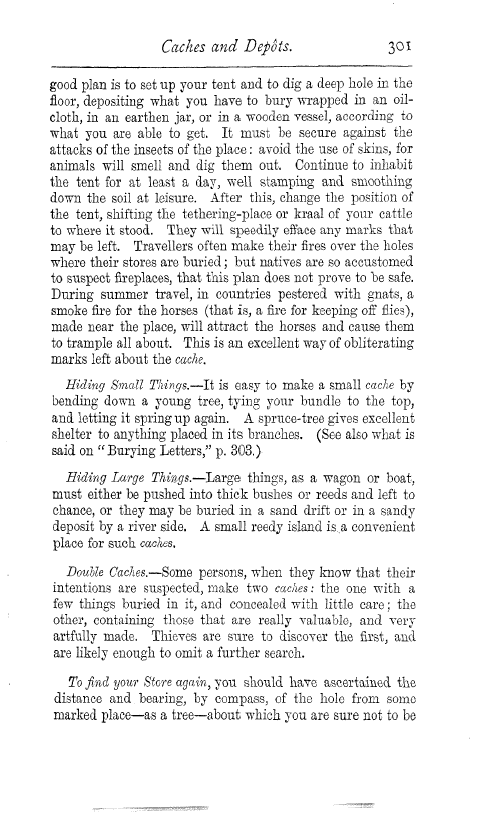Caches and Depots. 301
good plan is to set up your tent and to dig a deep hole in the floor, depositing what you have to bury wrapped in an oilcloth, in an earthen jar, or in a wooden vessel, according to what you are able to get. It must be secure against the attacks of the insects of the place : avoid the use of skins, for animals will smell and dig them out. Continue to inhabit the tent for at least a day, well stamping and smoothing down the soil at leisure. After this, change the position of the tent, shifting the tethering-place or kraal of your cattle to where it stood. They will speedily efface any marks that may be left. Travellers often make their fires over the holes where their stores are buried ; but natives are so accustomed to suspect fireplaces, that this plan does not prove to be safe. During summer travel, in countries pestered with gnats, a smoke fire for the horses (that is, a fire for keeping off flies), made near the place, will attract the horses and cause them to trample all about. This is an excellent way of obliterating marks left about the cache.
Hiding Small Things.-It is easy to make a small cache by bending down a young tree, tying your bundle to the top, and letting it spring up again. A spruce-tree gives excellent shelter to anything placed in its branches. (See also what is said on "Burying Letters," p. 303.)
Hiding Large Things.-Large things, as a wagon or boat, must either be pushed into thick bushes or reeds and left to chance, or they may be buried in a sand drift or in a sandy deposit by a river side. A small reedy island is._a convenient place for such caches.
Double Caches.-Some persons, when they know that their intentions are suspected, make two caches : the one with a few things buried in it, and concealed with little care ; the other, containing those that are really valuable, and very artfully made. Thieves are sure to discover the first, and are likely enough to omit a further search.
To find your Store again, you should have ascertained the distance and bearing, by compass, of the hole from some marked place-as a tree-about which you are sure not to be

